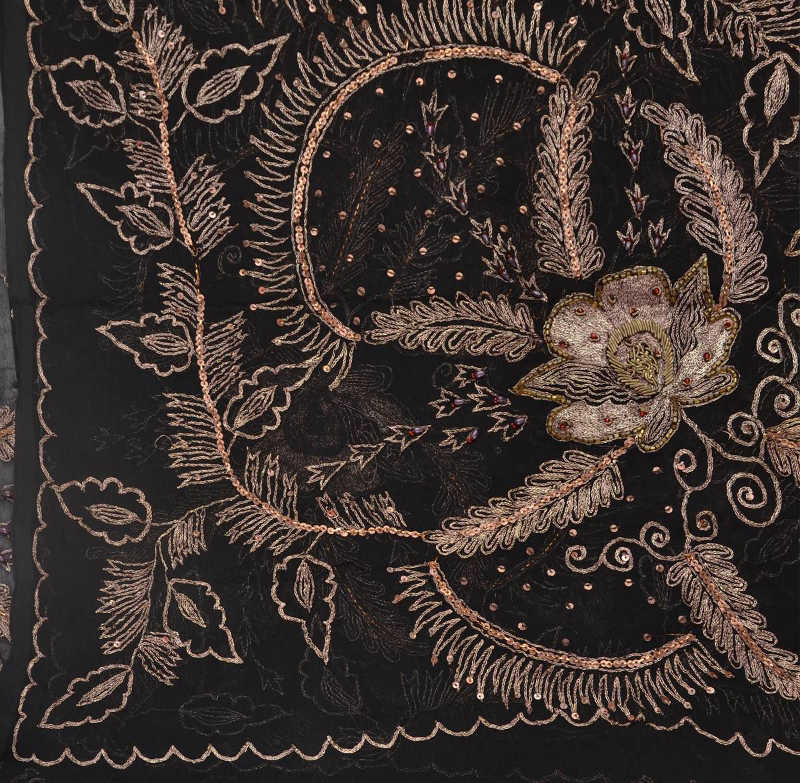===
0 922,
5
===

=== |
 |
khe;Nchnaa : 'To draw, drag, pull; to attract, to draw in, ... ; to draw out, to stretch; to extract; to pull off, strip off (the skin, &c.); to draw tight, to tighten'. (Platts p.887)
pardah : 'Curtain, screen, cover, veil, anything which acts as a screen, a wall, ... ; the surface of the earth; secrecy, privacy, modesty; seclusion, concealment; secret, mystery, reticence, reserve; screen, shelter, pretext, pretence'. (Platts p.246)
FWP:
SETS == A,B; GENERATORS; GRANDIOSITY
MOTIFS == VEIL
NAMES
TERMS == DRAMATICNESSSRF takes this as an unambiguously pious verse. In a biographical way that perspective might make sense; see for example {344,5}, in which Mir makes a sharp attack on what he considers un-Islamic views by some of his contemporaries, and SRF discusses Mir's own views.
But if we read this verse apart from biographical predispositions-- which is a far more interesting and exciting way to read it-- then it opens before us a whole universe of possibilities.
The first line, with that spectacularly versatile khe;Nchnaa (see the definition above), is obviously meant to keep us guessing. Here are some quite possible readings:
=Mankind has drawn itself along very far (humans have managed to achieve a great deal through their own efforts).
=Mankind has stretched itself out very far (humans have tried to reach out as far as they can in all directions in the universe).
=Mankind has withdrawn itself very far away from something (something has caused humans to feel real alarm or pain or aversion).
As usual, we hope for some clarification from the second line. And as so often, we get only a further branching of the tree of choices. For just consider the possibilities of that second line. The most efficient way to get a good 'connection' between the lines is to take the 'drawing' in the first line to refer to the 'drawing back' of a veil. Mankind has done a lot of 'drawing' of itself already. (Perhaps humans have even 'drawn' themselves along by means of 'drawing open' veils.) Now the addressee (mankind?) is being warned to stop and think for a moment about some seemingly urgent concern:
=Wouldn't the Lord be within that veil? (and might he not be angry at being exposed?)
=The Lord might not be within that veil! (and what a terrible shock that would be, if humans were alone in the universe!).
=May the Lord not be within that veil! (humans would rather reveal further layers of their own, human reality, than encounter divinity).
Moreover, what kind of a veil is it, the veil that might or might not hide the Lord? We know only that it's 'that veil' (or 'this veil', but in such an abstract verse the choice can hardly much difference). It could most obviously be the veil of human selfhood and ego, which mankind idealistically seeks to transcend. It could be the veil of ignorance, which mankind seeks to draw back through knowledge. It could be the veil of the physical world, which mystics seek to penetrate in pursuit of the divine. It could be the veil of death, from which mankind has 'drawn' itself as far away as possible.
We could also take pardah in a more extended sense (see the definition above). It can mean not only 'guise' or 'concealment' but even 'pretext, pretense'. This latter reading, especially, would call into question the whole nature of humanity's project of 'drawing itself very far'. But how, or why? What could humans possibly be up to? In that case, the injunction to 'just think a bit' would become more general, and would not be an urgent warning against opening some one particular veil.
Whatever pardah it might be, the verse asserts that in one way or another humans have done a lot of 'drawing' of themselves, and they should stop and think about what implications such 'drawing' might have, in relation to the (non?)presence of the Lord. Within that very broad framework, there's plenty of room for almost everybody's metaphysical reflections.